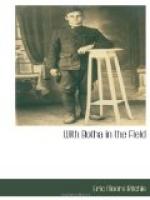Each half hour brought its surprise as we moved along, General Botha on his white horse at the head of the column, just visible to the eye through the thick curtain of white dust our horses’ feet flung up into the sun glare. We rode in great gorges between kopjes. We crossed dry river courses. We clattered over the hard bosoms of rocks, switchbacked up and down each hour working out of the desert. Trees began to appear—caricatures of trees. Then game spoor was reported. And suddenly, just after noon, rain fell—out of one cloud in a sky otherwise brazenly clear five drops fell. I counted five on my bridle hand.
Rain on the edge of the Namib Desert. It was ludicrous, too bizarre; it was the last straw. We gasped. A deep roar of ironical cheering went up. The Commander-in-Chief looked round and laughed. When we outspanned later the horses made a show of grazing for the first time for five months. The sagacious animals showed plain amazement in their eyes. At Wilhelmsfeste (Tsaobis) the bushveld begins. The water supply of Otjimbingwe is the feature of that rather quaint settlement. One must ever associate it with its fine aeromotor pumping the precious fluid for parched man and beast to drink their full after the desert passage in the shade of cool palms many years old.
[Illustration: German prisoners of war, imprisoned at Karibib] [Illustration: Karibib] [Illustration: Towards Windhuk. The first troops in Waldau]
[Illustration: The first South African Engineer Corps Staff at Windhuk]
During the great trek alarms regarding mines were most frequent. There were many wonderful escapes. It seems a marvel that the enemy were not more successful than they were with these deadly machines. Suffer casualties we did; but if all the mines that were laid had blown up our casualties would have been formidable indeed. But somehow those mines seemed foreordained not to act. They were discovered by the merest chance; or they failed to go off; or they exploded at the wrong time.
Making for Karibib in the forenoon of the 5th of May, the authorities naturally showed the greatest caution for the safety of General Botha— though a large body of Union mounted troops had passed over the same ground before the Commander-in-Chief, Staff and Bodyguard traversed the road.
In view of the fact that the South African Army was operating against the forces of the same nation that has ravaged and despoiled Belgium, a point should be made here. It must be remembered that the armed forces of the Protectorate simply cleared bag and baggage out of all the important inland towns in the face of Botha’s overwhelming advances. They left wife and child, the old and infirm, every stick of property they could not carry, at our mercy. When we entered Karibib at five in the evening the non-combatant population were moving about the streets, or standing in best bib and tucker at their doors, calmly gazing at the trek-stained horsemen that sought the nearest water tanks. They had not the slightest fear of us. I spoke to a comrade who has seen war aforetime. He said he had never seen a more orderly occupation of a town.




